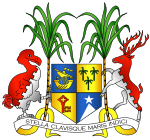 |
|---|
| Constitution |
Presidency |
Judiciary
|
Administrative divisions |
|
General elections were held in Mauritius in 1891.
 |
|---|
| Constitution |
General elections were held in Mauritius in 1891.
The 1885 constitution provided for a 28-member Legislative Council, which consisted of the Governor, 12 officials, 5 appointed members and 10 elected members. [1] The ten elected members were returned from nine constituencies formed from the nine districts, which all districts returning one member except Port Louis, which returned two. [2]
The franchise for the elections was severely limited; the right to vote was restricted to people with ₨300 of immovable property or movable property worth ₨3,000, a monthly salary of ₨50, those paying rent of ₨25 a month or paying a licence duty of at ₨200 a year. People married to eligible voters, or the oldest son of a qualifying widow were also entitled to vote. As a result, although the population of Mauritius was around 370,000, only 5,164 people were eligible to vote, of which just 401 were Asian. [3]